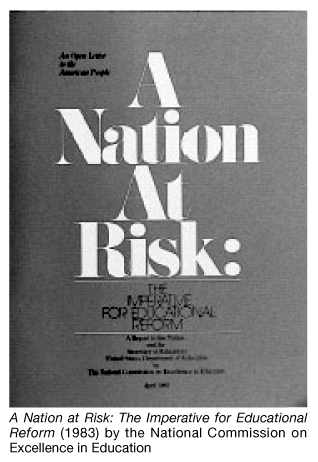| Home > Policy > White Paper, Notice, Announcement > White Paper > Japanese Government Policies in Education, Culture, Sports, Science and Technology 2001 >Chapter8 Section1.1 | ||
Educational Reform is considered in many Western and Asian countries, including Japan, to be a vital agenda that determines the future of each nation and its children. Movements toward educational reform began concurrently in the countries of these regions in the mid-1980s.
In the U.S., the National Commission's report of 1983, A Nation at Risk: The Imperative for Educational Reform, built momentum for movements of educational reform throughout the country. In the U.K., an educational reform policy by the Conservative government of then-Prime Minister Margaret Thatcher was embodied in the Education Reform Act of 1988, which put into effect various reform measures. In France, a new basic law of education named "Loi d'orientation sur l'education" was enacted in 1989 under then-President Fran??is Mitterrand. The law provided a foundation for subsequent educational reforms. Germany later started mostly higher education reforms in 1990s.
In Japan, the National Council on Educational Reform was created in 1984 to deliberate educational reform, which would be defined as the third comprehensive educational reform in Japan since the country's modernization in the Meiji era. In China, educational reform was taken up after the Communist Party announced its Decision on the Reform of the Educational Structure in 1985. China started efforts to modernize with "reform and opening up to the outside world" as important pillars of its educational reform policy. And in the Republic of Korea, the Presidential Commission on Education Reform was set up in 1985, and put together a plan of sweeping reforms.
Although these movements toward educational reform have since gone through various developments, reform is still a major policy issue today and even became the principal agenda in the general election in the U.K. and the presidential election in the U.S. British Prime Minister Tony Blair stressed that the most important policy agenda was "education, education, and education" in the general election in 1997, and U.S. President George W. Bush announced a new educational reform plan ahead of other policies right after his inauguration in January 2001.
Education was adopted as the major topic for the first time at the Summit meeting held in Cologne, Germany in June 1999 (the Cologne Summit) and based on the Summit's recommendation to implement follow-up meetings on educational issues, the G8 Education Ministers' Meeting and Forum was held in Tokyo in April 2000. This demonstrates the active engagement of the countries concerned in the effort toward educational reform as well as the fact that educational reform has become a common agenda to the countries.
The Cologne Charter, which was adopted at the Summit, recognized the advent of a knowledge-based society and pointed out the importance of a "Lifelong learning society," through which people can acquire necessary knowledge and qualifications. Under the same philosophy, the Education Ministers' Meeting held in Tokyo emphasized the utilization of distance education and IT and pointed out the importance of improving academic performance and developing sociability as an educational agenda in the face of a changing society.

| Back To Top | MEXT HOME |